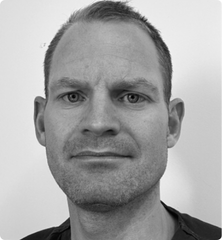Video 1 - Mini squat to back of chair
Position yourself standing with your knees straight. Bend your knees and then stand up straight again.
Video 2 - Lunge with twist and ball
Position yourself standing with one foot a large step-length in front of your other foot. Start with your knees straight. Finish with your knees bent by lowering your back knee towards the floor. Ensure that both of your feet point forwards.
Hold this position as you rotate your trunk from side to side ensuring you don’t let your knee twist.
Video 3 - Lunge with twist
Position yourself standing with one foot a large step-length in front of your other foot. Start with your knees straight. Finish with your knees bent by lowering your back knee towards the floor. Ensure that both of your feet point forwards.
Hold this position as you bounce a ball from side to side ensuring you rotate your trunk.
Video 4 - Lunge
Position yourself standing with one foot a large step-length in front of your other foot. Start with your knees straight. Finish with your knees bent by lowering your back knee towards the floor. Ensure that both of your feet point forwards.
Video 5 - Split squat
Sit on a chair/bench. Bring your affected foot directly underneath your knee, and your opposite foot just forwards. Cross your arms over your chest and try to stand up- you will feel this making your affected leg work the hardest. Return as if you were going to sit, but before you reach the chair stand up again.
Video 6 - Step down
Position yourself standing on a block / step with a foam cup placed on the floor in front of you. Practice lowering and raising your unaffected heel to touch the foam cup by bending and straightening your affected knee. Ensure that your shoulders remain over your hips, both feet point forwards and your unaffected leg does not squash the foam cup.
If you do not have a cup try to ensure your foot heading towards the floor only connects delicately before returning to standing on the step.
Video 7 - Step up
Position yourself in standing with a block / Step in front of you, both feet on the ground and a stable support nearby. Practice stepping up on to and off the block, one foot at a time. Ensure that hand support is used only if you feel unsteady.
Video 8 - STS with left leg bias using step
Position yourself sitting with your affected leg on the floor and your unaffected leg on a block. Practice standing up and sitting down. Ensure that your shoulders and knees move forwards while moving between sitting and standing, and you weight-bear mostly through your affected leg.
Video 9 - STS with left leg bias
Position yourself sitting with your affected leg back and your unaffected leg forwards. Practice standing up and sitting down keeping the leg forwards. Ensure that your shoulders and knees move forwards while moving between sitting and standing, and you weight-bear mostly through your affected leg.
Video 10 - STS with right leg bias using step
Position yourself sitting with your affected leg on the floor and your unaffected leg on a block. Practice standing up and sitting down. Ensure that your shoulders and knees move forwards while moving between sitting and standing, and you weight-bear mostly through your affected leg.
Video 11 - STS with right leg bias
Position yourself sitting with your affected leg back and your unaffected leg forwards. Practice standing up and sitting down keeping the leg forwards. Ensure that your shoulders and knees move forwards while moving between sitting and standing, and you weight-bear mostly through your affected leg.
Video 12 - Terminal knee extension
Position yourself standing in front of a bed with your knee slightly bent and a piece of foam placed between your knee and the bed. Practice straightening your knee to squash the foam against the bed.
Alternatively you can complete this exercise with some theraband around your knee. The further your knee is bent to begin with the more you will have to overcome the resistance of the theraband and strengthen your knee.

